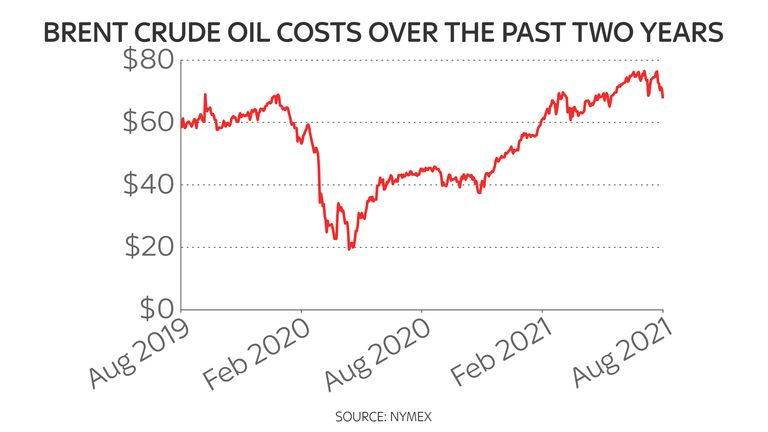Global oil prices took a further pounding on Monday as the market ponders the chance of a coronavirus-driven slump in demand in the world’s second-largest economy.
Analysts cited a toxic cocktail of reasons for the latest sell-off, which first surfaced at the end of last month.
The international benchmark, Brent crude, suffered its worst weekly loss in four months last week by falling 6%.
Monday saw a further slide of more than 4% to $67 a barrel while US futures indicated the plunge had even further to go.
Prices had generally recovered steadily since a COVID-19 pandemic slump early last year that saw Brent hovering below $20 a barrel at one stage and US West Texas Intermediate crude even trading in negative territory as major economies entered extended lockdowns.
In Brent’s case, the price rises were a result of production cuts by the major oil-producing nations to better match supply and demand but also the lifting of coronavirus restrictions in major economies.
China had been racing ahead in its output recovery but there is now growing evidence of disruption from a surge in the Delta variant.
New figures showed China’s export growth slowed more than analysts expected in July – blamed on COVID but also the impact of widespread floods.
Import data was also weaker than forecast and showed oil deliveries falling on the previous month.
New restrictions have resulted in flight cancellations, warnings by 46 cities against travel and limits on public transport and taxi services in 144 of the worst hit areas.
Infections in Malaysia and Thailand also hit new records, adding to the jitters.
Market analysts said that a stronger dollar – which is used to price oil and raises costs for holders using other currencies – also contributed to the price falls.
They pointed too to pressure on the industry following the publication of a major United Nations report on the impact of climate change caused by humanity.
But Oanda’s senior market analyst, Jeffrey Halley, said in a note: “Both (benchmark crude) contracts look vulnerable to more bad news on the virus front, focusing on mainland China.”
Any further falls in oil costs will be welcome news for consumers as rising energy prices have been a key driver behind a surge in living costs over the past five months.
The Bank of England warned just last week that the rate of consumer prices inflation could top 4% by the year’s end – the highest level for 10 years – exacerbated by a number of other factors including product shortages.








